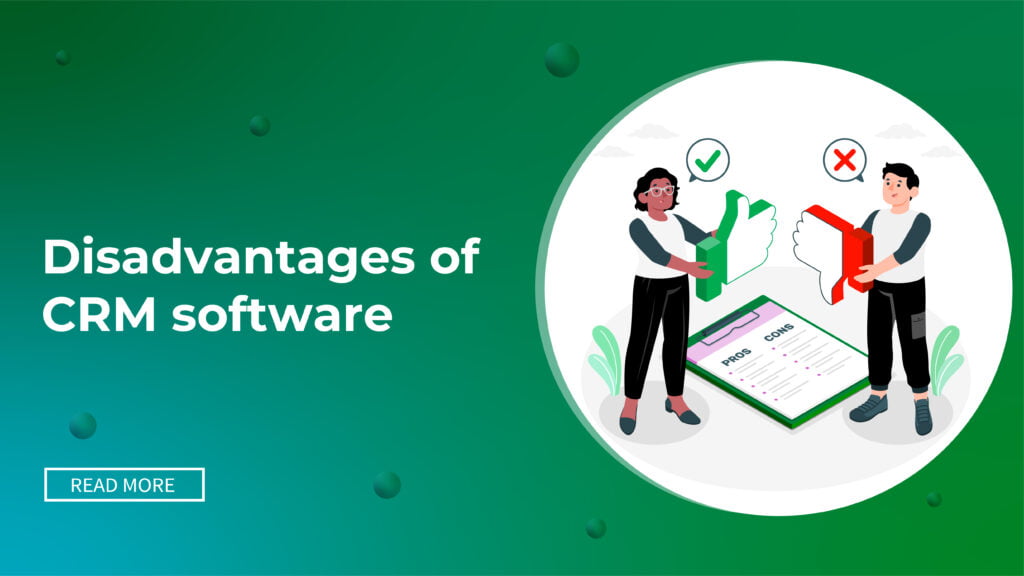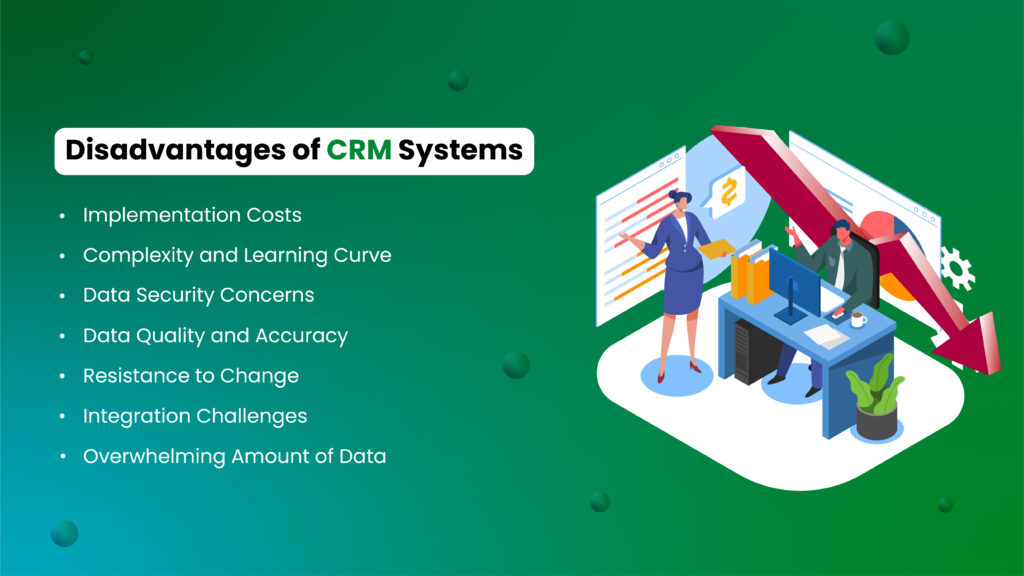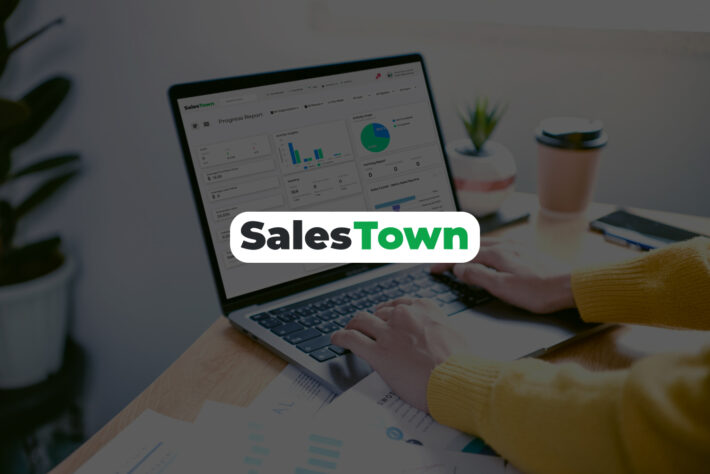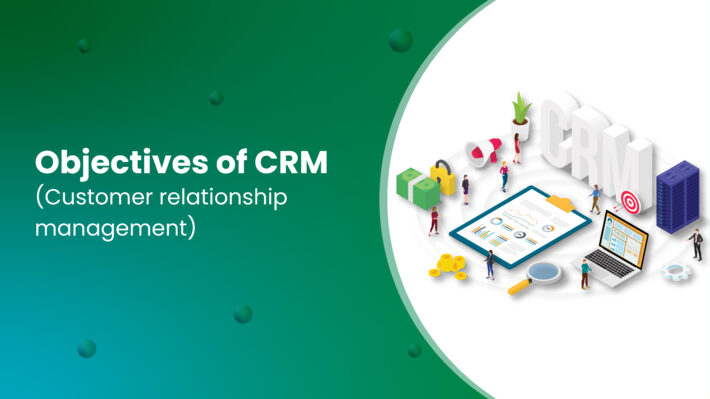Disadvantages of CRM Software in Business

CRM systems have become an essential component of modern businesses, assisting companies in streamlining their contacts with clients and managing important information. While there are various advantages to adopting CRM systems, it is critical to recognize that they also have drawbacks. In this blog, we will look at the various downsides and challenges of CRM systems in the business world.

Understanding CRM: Customer Relationship Management Explained
CRM, or Customer Relationship Management, is a complete strategy to manage an organization’s interactions with its customers, clients, and potential clients. It involves putting technology to use to organize, automate, and synchronize company activities such as sales, marketing, customer care, and technical support. CRM’s primary purpose is to improve and streamline customer interactions, resulting in increased revenue and client loyalty.
Key Features of CRM Systems:
Contact Management: CRM systems enable organizations to keep detailed records of their consumers, such as contact information, purchase history, and preferences.
Sales and Lead Management: Throughout the sales process, CRM can monitor sales leads, opportunities, and customer interactions.
Automation: It involves using technology to automate repetitive tasks such as data entry, follow-ups, and lead nurturing.
Customer Support and Service: CRM can aid in the management of support tickets and the delivery of customer service.
Analytics and Reporting: CRM enables decision-making by providing insights into consumer behavior and business performance.
Read also: Key Feature of CRM
Here are Some Disadvantages of CRM Software
Implementation Costs
One of the most significant drawbacks of CRM systems is the initial expense of deployment. Many organizations, particularly small and medium-sized enterprises (SMEs), find it costly to acquire and integrate CRM software into their existing processes. This frequently entails purchasing licenses, hardware, and software, as well as spending on employee training. The installation cost can be significant and may not deliver instant results.
Complexity and Learning Curve
CRM systems can be complex, and it may take some time for employees to adjust to the new program. It can take time to learn how to use the CRM efficiently, understand its different capabilities, and integrate it into regular routines. During the changeover period, this learning curve can have an impact on productivity and prevent staff from focusing on their primary duties.
Data Security Concerns
CRM systems become a major target for hacks because they store valuable client data. Security breaches and data leaks can have serious consequences, including loss of customer trust and possibly legal action. Businesses that use CRM systems must invest in effective cybersecurity safeguards to protect this important information. This adds another degree of complexity and cost to CRM installation.
Data Quality and Accuracy
Another disadvantage of CRM systems is the possibility of data inaccuracy and inconsistency.Over time, as data is entered and updated by different employees, errors can occur. Incorrect data can result in poor marketing strategies, lost sales opportunities, and poor decision-making. Maintaining data quality necessitates ongoing monitoring and maintenance, which can be a time-consuming effort.
Resistance to Change
Employees who have become used to old practices frequently resist the implementation of a CRM system. They may be cautious to adopt new technology because they are concerned about job uncertainty or extra work. Change resistance can be an important barrier to the successful adoption and use of CRM systems within an organization.
Integration Challenges
CRM systems are most effective when they seamlessly integrate with other software and applications used within an organization. Obtaining this level of integration, however, can be difficult, especially for firms with various IT infrastructures. Integration difficulties can result in data silos, impeding a comprehensive view of consumer information and reducing the system’s effectiveness.
Overwhelming Amount of Data
CRM systems can generate an overwhelming amount of data. Sorting through this data to extract significant insights can be time-consuming and difficult. Businesses may end up drowning in data rather than getting meaningful insights. Managing and interpreting CRM data can be difficult without the right tools and experience.
Read Also: Advantages of CRM Software
Why You Should Still Invest in Good Customer Relationship Management
While no system is perfect, the benefits of a strong customer relationship management (CRM) platform far outweigh any potential drawbacks. Even with its limitations, CRM software remains an essential tool for managing key customer data and interactions. With the right CRM, you gain invaluable insights into customer needs and behaviors, allowing you to provide more personalized and timely service. Automated workflows improve efficiency and enable consistent follow-up across teams. Robust analytics and reporting transform vague guesses into data-driven decisions, helping you identify growth opportunities. And integrations unite siloed systems to give agents the full context they need to resolve issues faster. Without the single source of truth a CRM provides, you’re left blind, disjointed and reactive. Though no solution is one-size-fits-all, today’s customizable platforms make it easier than ever to tailor your CRM to your unique business needs. So don’t leave your customer experience to chance.
Salestown CRM offers the ideal balance of comprehensive functionality and ease of use. Sign up for a custom demo today to see for yourself. Salestown will provide you the CRM advantage you need to drive growth, without the common disadvantages getting in your way.


